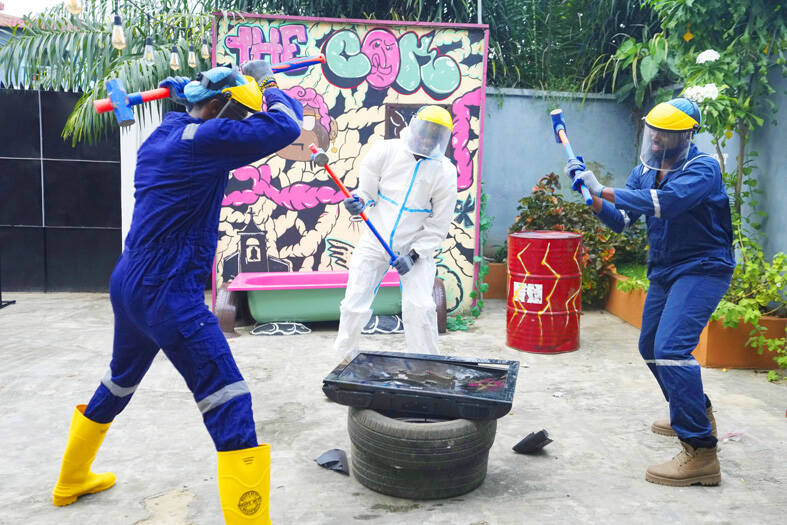In Lagos, Nigeria’s largest city, people are finding their reset button in a “rage room” where they pay to smash electronics and furniture with a sledgehammer as a break from the worst cost-of-living crisis in a generation.
The Shadow Rage Room, apparently the first of its kind in Nigeria, offers “a safe space” for people to let out pent-up emotions, the founder and physician James Babajide Banjoko said.
He said the idea came to him during the COVID-19 pandemic in 2020 after he lost his mother and struggled with work.

Photo: AP
For 7,500 naira (US$4.80), customers are left alone with protective gear and a sledgehammer or bat in a room for a 30-minute session with the items that are later recycled.
Times are tough in Nigeria, a country of more than 200 million people where growing frustration among young people led to recent mass protests in which several people were killed by security forces. The inflation rate has reached a 28-year-high of 33.4 percent, while the naira has fallen to record lows against the US dollar.
Mental health services remain foreign or unaffordable for many in Africa’s most populous country, where 40 percent of citizens live below US$2 per day.
The West African nation has fewer than 400 registered psychologists, the Nigerian Association of Clinical Psychologists said.
That is one psychologist for about every 500,000 people.
Even when therapy is available, stigma remains a challenge, association president Gboyega Emmanuel Abikoye said in an interview.
Rage rooms are not necessarily new in other parts of the world, and there is no documented evidence of their mental health benefits beyond the momentary relief that comes with venting your feelings, Abikoye said.
Experts in Nigeria instead see a growing need for more long-term emotional support, especially among young people.
In Lagos, a city of about 20 million people and a magnet for those seeking better opportunities, such needs are even more pronounced. Daily stressors include traffic jams notorious for trapping drivers and passengers on streets for hours in heat and smog in one of the world’s most polluted cities.
Some Nigerians have turned to social media platforms like TikTok as a way to cope with stress. Some find support in communities wherever they can, from the church or mosque to the gym.
Now there is the rage room, which opens on weekends and is usually fully booked up to two weeks ahead, Banjoko said.
At the end of one session of smashing, Olaribigbe Akeem, a recent visitor, came out sweating, but relieved and visibly happy.
“As an average Nigerian, you get to deal with a lot every day,” Akeem said. “The anger has been piling up [and] instead of venting on somebody, this is the best avenue for me, and I feel a lot renewed.”
Rage room visitors also include couples who want to get something off their chest.
At times, people come in for recreation, but find something more.
“My favorite people are those that ... just want to try it, and at the end of the day, you see them, they break down, they cry, they become very expressive,” Banjoko said.
He said he often refers them to therapy.
Maymunah Yusuf Kadiri, a psychiatrist in Lagos, said that any benefit from smashing things is usually short-lived and cannot be a replacement for therapy.
The practice also risks making someone less likely to use “healthy coping strategies,” she said, adding that she is concerned that “repeated engagement ... might reinforce aggressive tendencies.”
At the rage room, some customers said their problems feel lighter only until they leave.
However, being vulnerable with yourself while inside, sledgehammer in hand, is still worth it, said Eka Stephanie Paul, an actor and TV host.
“Problem no dey finish anyway,” she said in the pidgin widely spoken across Nigeria, acknowledging that the rage room is hardly a cure. “But right now, I feel very light.”

LANDMARK CASE: ‘Every night we were dragged to US soldiers and sexually abused. Every week we were forced to undergo venereal disease tests,’ a victim said More than 100 South Korean women who were forced to work as prostitutes for US soldiers stationed in the country have filed a landmark lawsuit accusing Washington of abuse, their lawyers said yesterday. Historians and activists say tens of thousands of South Korean women worked for state-sanctioned brothels from the 1950s to 1980s, serving US troops stationed in country to protect the South from North Korea. In 2022, South Korea’s top court ruled that the government had illegally “established, managed and operated” such brothels for the US military, ordering it to pay about 120 plaintiffs compensation. Last week, 117 victims

‘HYANGDO’: A South Korean lawmaker said there was no credible evidence to support rumors that Kim Jong-un has a son with a disability or who is studying abroad South Korea’s spy agency yesterday said that North Korean leader Kim Jong-un’s daughter, Kim Ju-ae, who last week accompanied him on a high-profile visit to Beijing, is understood to be his recognized successor. The teenager drew global attention when she made her first official overseas trip with her father, as he met with Chinese President Xi Jinping (習近平) and Russian President Vladimir Putin. Analysts have long seen her as Kim’s likely successor, although some have suggested she has an older brother who is being secretly groomed as the next leader. The South Korean National Intelligence Service (NIS) “assesses that she [Kim Ju-ae]

In the week before his fatal shooting, right-wing US political activist Charlie Kirk cheered the boom of conservative young men in South Korea and warned about a “globalist menace” in Tokyo on his first speaking tour of Asia. Kirk, 31, who helped amplify US President Donald Trump’s agenda to young voters with often inflammatory rhetoric focused on issues such as gender and immigration, was shot in the neck on Wednesday at a speaking event at a Utah university. In Seoul on Friday last week, he spoke about how he “brought Trump to victory,” while addressing Build Up Korea 2025, a conservative conference

China has approved the creation of a national nature reserve at the disputed Scarborough Shoal (Huangyan Island, 黃岩島), claimed by Taiwan and the Philippines, the government said yesterday, as Beijing moves to reinforce its territorial claims in the contested region. A notice posted online by the Chinese State Council said that details about the area and size of the project would be released separately by the Chinese National Forestry and Grassland Administration. “The building of the Huangyan Island National Nature Reserve is an important guarantee for maintaining the diversity, stability and sustainability of the natural ecosystem of Huangyan Island,” the notice said. Scarborough